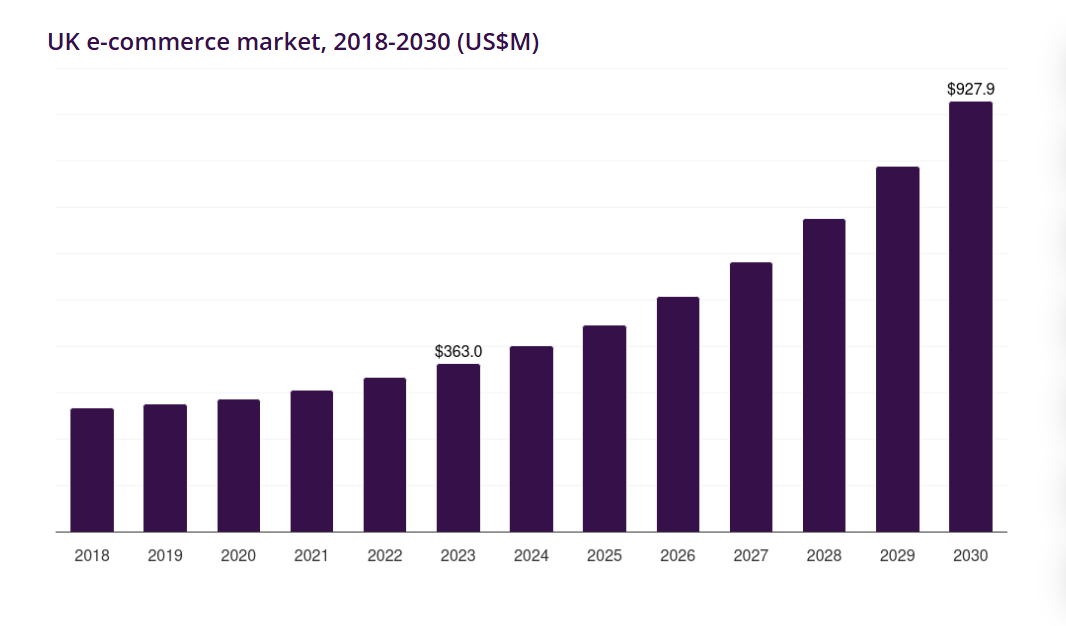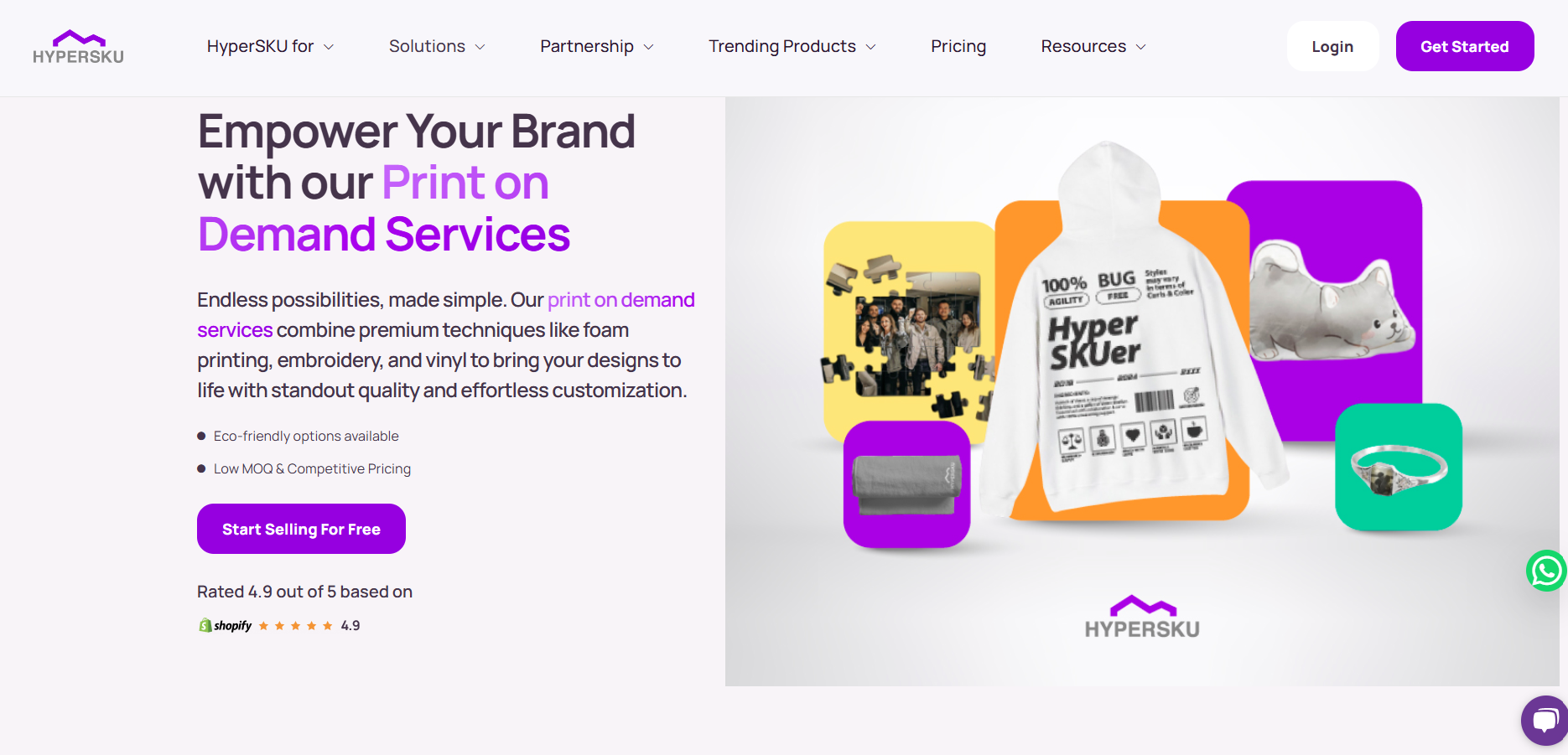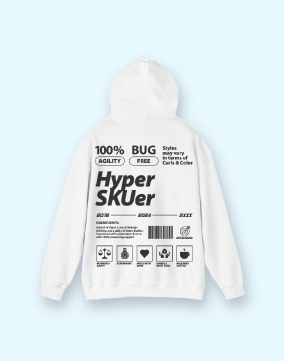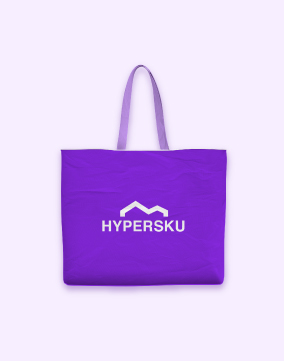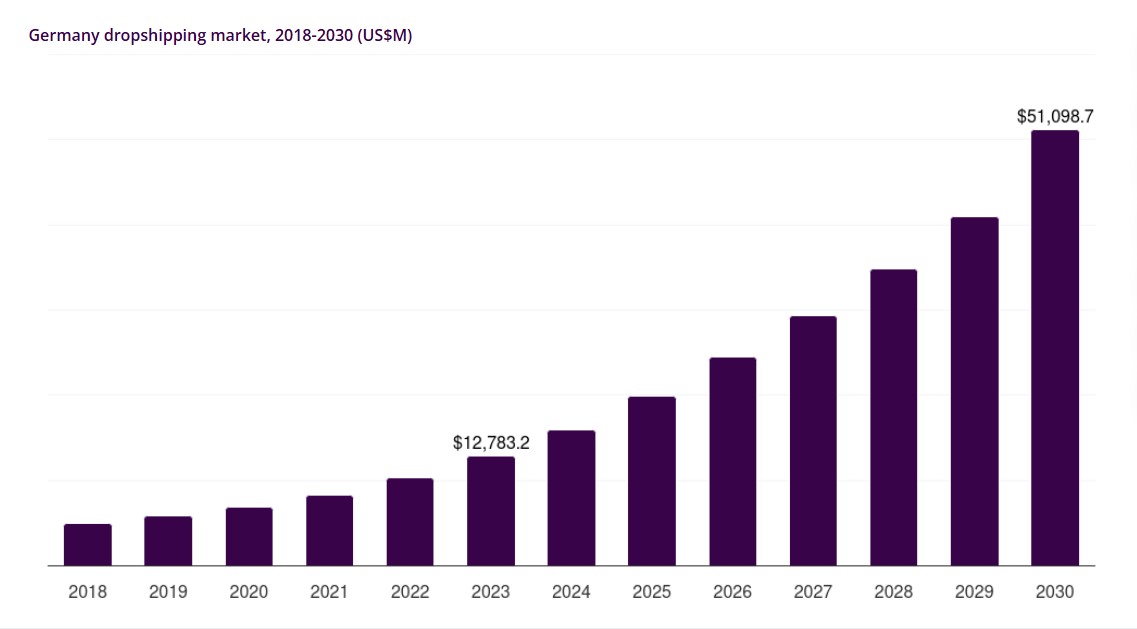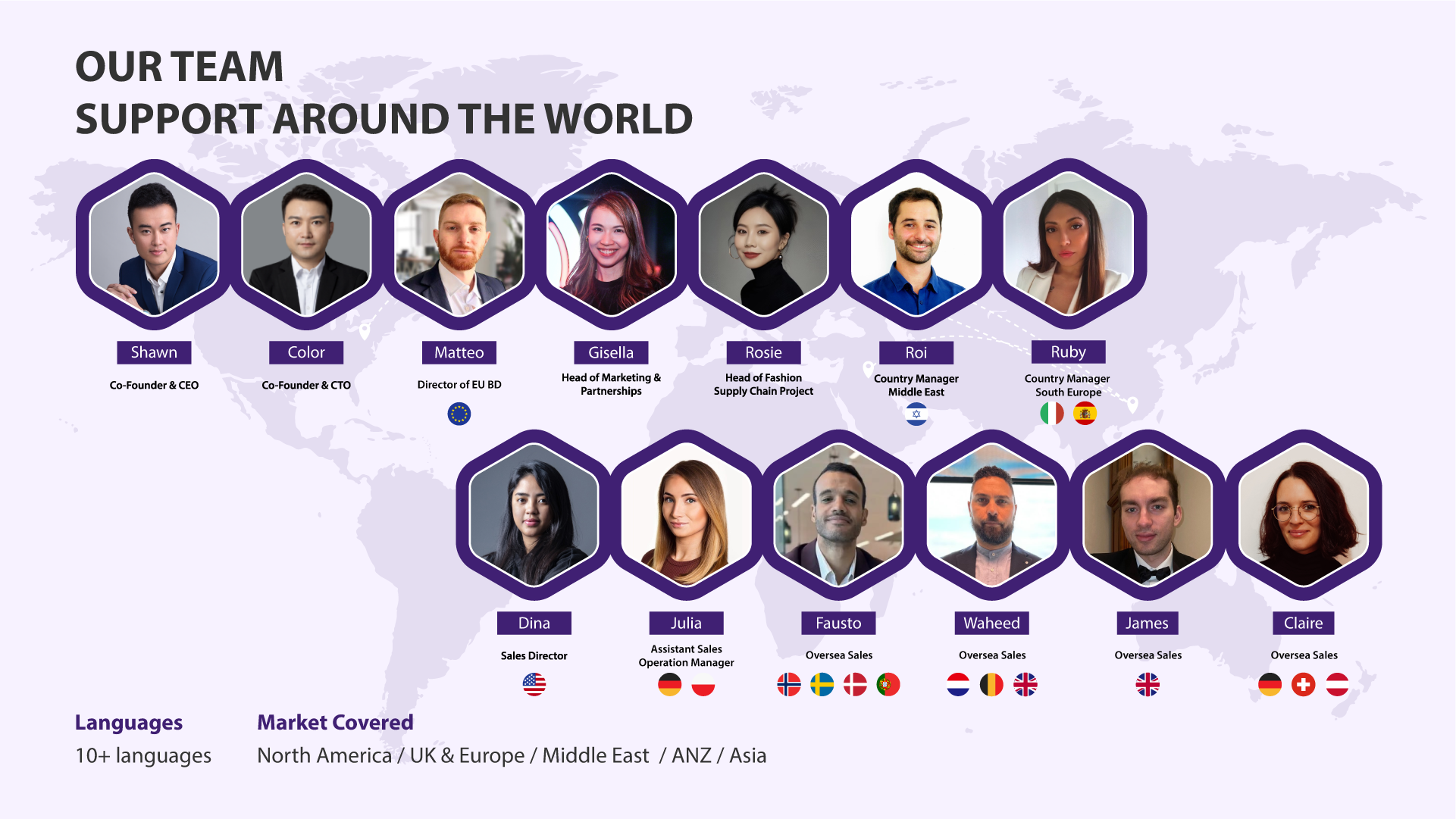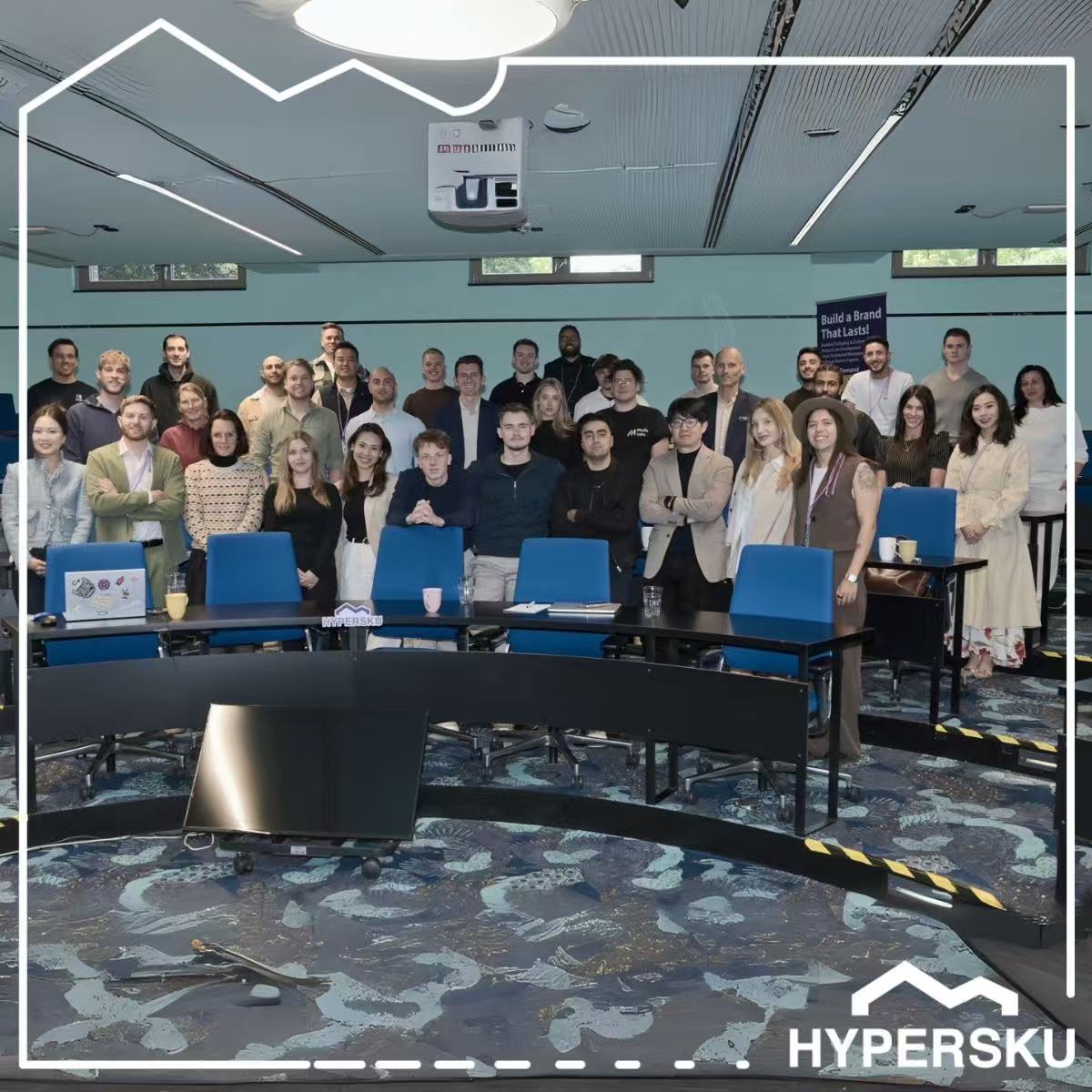Thinking of launching your own online store but don’t want to deal with inventory, upfront investment, or shipping logistics? Print on Demand (POD) might be your perfect business model — and the UK is one of the best markets to get started in 2025.
Whether you’re a content creator looking to monetize your creativity or an entrepreneur eager to enter the booming eCommerce world, POD offers a low-risk, scalable way to sell customized products with minimal overhead. From t-shirts and tote bags to mugs and wall art, the options are endless — and you don’t even need to touch a single product.
The global print on demand market size was valued at USD 6.18 billion in 2022 and is expected to grow at a compound annual growth rate (CAGR) of 25.8% from 2023 to 2030, driven by the growing demand for personalized merchandise and the convenience of online shopping.
With a reliable partner like HyperSKU, turning your design ideas into a real business is easier than ever.
In this article, we cover:
- What Print on Demand is and how it works
- Why the UK is a hot market for POD in 2025
- Legal basics you should know before starting
- Step-by-step instructions to launch your store
- Trending POD products to sell
- Why HyperSKU is the ideal POD partner for UK sellers
- Common FAQs from new POD entrepreneurs
Let’s dive in!
What is Print on Demand?
Definition of POD
Print on Demand (POD) is a business model that allows you to sell customized products without holding inventory. When a customer places an order, the item is produced, printed, and shipped directly from a third-party supplier—only after the purchase is made. This removes the need for upfront investment, bulk production, or fulfillment logistics on the seller’s part.
In other words, you create the design—your supplier handles the rest.
Print on Demand vs. Traditional eCommerce
While traditional eCommerce often requires you to pre-purchase inventory, rent storage, and manage fulfillment, print on demand is built for speed and flexibility. Here’s a quick breakdown:
|
Feature |
Traditional eCommerce |
Print on Demand |
|
Inventory |
Needs to be purchased upfront |
No inventory—products are made to order |
|
Upfront costs |
High (stock, warehouse, staff) |
Low (mainly design + store setup) |
|
Risk of overstock |
High |
Low |
|
Fulfillment & shipping |
Self-managed or outsourced |
Automated by suppliers |
|
Product customization |
Limited |
Highly customizable |
For creators and small businesses, POD offers a lower-risk, scalable way to launch a brand—especially in a fast-moving and competitive market like the UK.
Why Start a Print-on-Demand Business in the UK?
In this section, we’ll explore why the UK stands out as a prime location for your next print on demand venture, from impressive market growth to evolving customer behavior and regional logistics advantages.
eCommerce Growth in the UK
The UK continues to be one of the most dynamic and promising markets for online retail in Europe. According to Grand View Research, the UK e-commerce market generated a revenue of USD 363.0 million in 2023 and is projected to reach USD 927.9 million by 2030, growing at a compound annual growth rate (CAGR) of 14.3% from 2024 to 2030.
This steady growth reflects both consumer confidence in online shopping and increasing digital penetration across age groups. For entrepreneurs exploring print on demand (POD), the UK’s maturing yet expanding e-commerce ecosystem offers a reliable base to build and scale a brand.
Growing Demand for Personalized Products
One of the key drivers behind the success of print on demand is the rising consumer demand for personalized and unique products. In the UK, this trend is particularly strong among younger consumers, who are increasingly seeking items that reflect their individuality and values.
The UK personalized gifts market is poised for strong growth between 2025 and 2029, with the market size expected to increase by USD 1.26 billion, reflecting a robust compound annual growth rate (CAGR) of 11% from 2024 to 2029. This surge highlights consumers’ growing interest in custom-made items, from apparel and accessories to home décor and gifts.
For content creators, designers, or influencers looking to monetize their brand through meaningful, custom merchandise — POD is not just a business model, but a way to directly connect with a highly engaged audience.
UK vs. EU Market Comparison
While both the UK and EU offer excellent opportunities for launching a print on demand business, there are key differences that can influence your strategy — particularly around language, taxation, and market nuances. Here’s how the UK compares to its European neighbors:
|
Market Factor |
United Kingdom |
European Union |
|
Language |
Single language (English) |
Multilingual (French, German, Spanish, etc.) |
|
Consumer Expectations |
High — similar across both regions |
High — varies slightly by region |
|
Market Maturity |
Advanced and well-established |
Advanced — varies slightly by country focus |
|
Taxation (Post-Brexit) |
Separate VAT system |
Unified under EU VAT regulations |
If you’re targeting an English-speaking audience or creating culturally specific products (such as UK-themed humor, slang, or holidays), the UK remains a natural and focused entry point for launching a POD business.
Is Print on Demand Legal in the UK?
Yes — Print on Demand (POD) is entirely legal in the UK, as long as your business complies with relevant laws around business registration, taxation, intellectual property, and consumer protection. Here’s what you need to know before launching your POD store:
Business Registration & Tax Obligations (incl. VAT)
To operate a legal Print on Demand (POD) business in the UK, you need to set up a registered business entity. The most common business structures are:
- Sole Trader – Simple to set up and manage, making it a popular choice for small POD businesses. However, you’re personally liable for any business debts.
- Partnership – Shared ownership between two or more individuals, with shared liability.
- Limited Liability Partnership (LLP) – A flexible structure where partners have limited liability.
- Limited Company – A separate legal entity that offers liability protection but involves more administrative duties and formal reporting.
Most first-time POD sellers choose to register as a sole trader because it’s fast and low-cost. But it’s important to understand the trade-off: you are personally responsible for any financial losses or debts your business incurs.
Want to become a sole trader? The UK government’s official guide explains how to register and manage your self-employed status.
Income Tax
In the UK, you must pay income tax on profits earned through your business. The amount depends on how much of your income exceeds your Personal Allowance and falls into each tax band:
|
Band |
Taxable Income |
Tax Rate |
|
Personal Allowance |
Up to £12,570 |
0% |
|
Basic Rate |
£12,571 to £50,270 |
20% |
|
Higher Rate |
£50,271 to £150,000 |
40% |
|
Additional Rate |
Over £150,000 |
45% |
Most small POD businesses will fall into the basic rate bracket. You’ll need to keep accurate records and submit a Self Assessment tax return each year, typically by 31 January.
VAT (Value Added Tax)
You must register for VAT if your taxable turnover exceeds £90,000 in any 12-month period. Once registered, you’ll need to:
- Charge VAT (usually 20%) on most goods and services
- File VAT returns with HMRC (typically every quarter)
- Display VAT-inclusive pricing clearly on your store
Voluntary VAT registration is allowed even below the threshold and can be beneficial in certain cases — for example, if you want to reclaim VAT on business-related purchases.
Intellectual Property (IP) & Design Rights
Selling custom designs doesn’t mean you can use any artwork or content. In the UK, you’re legally responsible for ensuring the designs on your products do not infringe on existing copyrights, trademarks, or image rights.
Key reminders:
- Avoid using celebrity likenesses, brand logos, or copyrighted characters (even if “fan-made”).
- Use original artwork or commercially licensed graphics.
- Consider registering your own designs with the UK Intellectual Property Office (UKIPO) for added protection.
Using unlicensed designs may result in takedown notices, lawsuits, or account suspensions — especially on platforms like Etsy, eBay, or Shopify.
Consumer Protection Laws & Return Policies
UK eCommerce is regulated under strong consumer rights laws, including:
- The Consumer Contracts Regulations (2013): POD sellers must provide clear product descriptions, pricing, and estimated delivery times.
- Right to Cancel: Most goods have a 14-day cooling-off period. However, personalized or made-to-order products (like POD items) are exempt from this — just be sure to state this clearly in your return policy.
Still, you should:
- Provide responsive customer support.
- Offer refunds or replacements for faulty items.
- Maintain clear shipping and return terms in your FAQ section.
Being transparent and compliant builds trust and repeat customers.
Partnering with vetted suppliers and ensuring fast fulfillment, HyperSKU supports sellers in maintaining high customer satisfaction — a key to long-term success in the competitive POD landscape.
How to Start a Print on Demand Business in the UK (Step-by-Step)
Once you understand the legal basics and compliance requirements, it’s time to get your business off the ground. Launching a POD business in the UK is easier than ever — especially with the right tools and partners by your side. Here’s a quick step-by-step guide to help you get started:
Step 1: Choose Your Niche and Product Range
Pick a niche that aligns with your interests or target audience — whether it’s pet lovers, gamers, fitness fans, or new parents. From there, select products that resonate with them. The more specific your niche, the easier it is to stand out.
Step 2: Create Your Designs
Great designs are the backbone of any successful POD store. You can design them yourself using tools like Canva or Adobe Illustrator, or collaborate with freelance designers on platforms like Fiverr or Upwork.
Source: Unsplash
Step 3: Select a Reliable POD Supplier
Your fulfillment partner can make or break your business. Look for a supplier with high-quality products, transparent pricing, fast shipping, and good customer support.
At HyperSKU, we connect you with vetted suppliers, offering a curated catalog of POD products — including custom hoodies, towels, thank-you cards, and more — with fast and reliable fulfillment to the UK.
Step 4: Build Your Online Store
Use platforms like Shopify, Etsy, or WooCommerce to create your storefront. Make sure to optimize your product listings with strong visuals, clear descriptions, and SEO-friendly copy.
Step 5: Launch and Market Your Brand
Once your store is ready, spread the word! Use social media (Instagram, TikTok, Pinterest), influencer collaborations, and paid ads to drive traffic. Don’t forget email marketing and customer reviews — they’re key for long-term growth.
Best Print on Demand Products to Sell in the UK (2025 Trends)
In 2025, the UK’s POD market continues to evolve with consumer demand leaning toward personalization, sustainability, and emotional value. Let’s take a look at some of the top-performing and trending POD product categories you should consider — many of which are already offered via HyperSKU’s growing product catalog.
Apparel: T-Shirts & Hoodies
Staples of the POD world, custom apparel remains a top-selling category. In the UK, hoodies are especially popular during colder months and perform well when tailored to specific interests, slogans, or humor. With HyperSKU, sellers can easily source high-quality blank hoodies in a variety of sizes and colors, ready for print.
Home Décor: Cushions, Towels, and Wall Art
Products like shaped cushions and luxury towels are more than just practical — they double as branding opportunities or thoughtful gifts. For example, branded towels are becoming popular as conference swag, offering both function and visual appeal. Wall prints, canvas art, and framed posters also perform well on platforms like Etsy and Not On The High Street.
Accessories: Phone Cases, Tote Bags
Personalized stationery is making a strong comeback in 2025, especially for small businesses wanting to elevate customer experience. POD thank-you cards are an affordable and impactful upsell or branding element. Similarly, customizable phone cases and tote bags cater to both practicality and personal expression — a sweet spot for Gen Z and millennial shoppers.
Niche-Specific Items: Jewelry, Puzzles & Pet Products
Niche targeting is key in the competitive UK market. For example:
- Personalized jewelry sees peak sales during key moments like anniversaries, Mother’s Day, or graduation — great for evergreen emotional gifting.
- Custom puzzles — often featuring family photos — gained traction as cozy, screen-free activities and remain popular among families and gift buyers.
- Dog bowls and other custom pet supplies continue to surge in popularity as more UK households treat pets as family members, demanding personalization even for their furry (or hairless) companions.
Sustainable & Eco-Friendly POD Products
UK consumers are increasingly eco-conscious. Offering organic cotton apparel, recycled tote bags, or biodegradable packaging adds long-term brand value and appeals to sustainability-minded buyers. Partnering with a supplier that understands this trend — like HyperSKU — helps you stay aligned with evolving consumer values while maintaining premium quality and fast fulfillment.
Why Choose HyperSKU for UK Print on Demand?
You’ve laid the groundwork — done the research, picked your niche, and wrapped your head around UK laws and tax requirements. Now comes the exciting part: bringing your vision to life.
That’s where the right partner makes all the difference.
At HyperSKU, we’re here to help you turn those big ideas into a thriving business — with premium products, smart tools, and reliable support every step of the way.
Wide Range of Customizable Products from Vetted Suppliers
At HyperSKU, we understand that product quality makes or breaks your brand — especially in the print on demand space. That’s why we work exclusively with vetted suppliers who meet strict standards for craftsmanship, consistency, and reliability.
From cozy lifestyle essentials to thoughtful, personalized gifts, our extensive catalog of customizable products empowers you to build a brand that’s both creative and credible. Each item is carefully sourced to ensure it’s not just printable, but worth printing on.
Whether you’re catering to niche audiences or selling across seasons, you’ll find the quality and flexibility you need to keep customers coming back.
In-House Fashion and Product Expertise
At HyperSKU, we don’t just connect you with products — we understand them.
Our in-house team includes fashion experts who stay ahead of trends and know what sells. We’re familiar with premium POD techniques like embroidery, puff (foam) printing, vinyl transfer, and more — and we help ensure your products look polished, professional, and ready to impress.
Whether you’re curating a seasonal capsule or testing a niche idea, we’re here to help you align your product strategy with market demand — not just what’s trending, but what’s timeless.
Fast Fulfillment & Shipping to the UK
With reliable warehousing and streamlined fulfillment services, HyperSKU enables fast delivery across the UK and surrounding regions.
In China, we operate multiple warehouses strategically located near major ports, which accelerates order processing and enables express international shipping. Depending on the shipping line, delivery from China to the UK can take as little as 3–7 days.
This logistics setup helps reduce delivery times and shipping costs, minimizes customs-related delays, and ensures greater transparency and control throughout the fulfillment process — all crucial for meeting modern UK buyer expectations.
Seamless Integration & Smart System
Managing a Print on Demand business involves juggling many moving parts — your tools should simplify the process, not complicate it.
HyperSKU integrates effortlessly with major platforms like Shopify, WooCommerce, and more, enabling smooth product uploads, real-time order syncing, and automatic tracking updates. Our smart backend system helps you stay organized, from inventory management to shipping statuses and streamlined returns.
With automated workflows and a user-friendly dashboard, you can spend less time on manual tasks and more time focusing on building your brand.
Professional & Personalized Support
Growing a Print on Demand brand takes more than just great products — you need reliable people in your corner. At HyperSKU, we provide responsive, hands-on support tailored to your needs at every stage.
Whether you have questions about product customization, order tracking, or scaling strategies, our team is here to help — fast, friendly, and always focused on your goals.
Final Thoughts
Starting a Print on Demand business in the UK has never been more promising. With strong consumer demand, a mature eCommerce ecosystem, and accessible tools, it’s an ideal time to turn your designs into a thriving brand.
From choosing the right niche to ensuring smooth fulfillment, every step counts — and having a trusted partner like HyperSKU by your side can make the journey easier, faster, and more rewarding.
Ready to launch your UK POD business? Let’s build something brilliant together.
FAQ: Print on Demand in the UK
Is Print on Demand profitable in the UK?
Yes. With rising demand for customized products and a mature eCommerce landscape, the UK is a promising market for POD businesses — especially if you choose the right niche and quality suppliers.
Do I need to register a business to start POD in the UK?
If you’re selling products with the intention of making a profit, you’ll need to register as self-employed or choose another legal structure (like a limited company) to stay compliant with tax and legal obligations.
What are the most popular Print on Demand products in the UK?
Trending categories include apparel (like hoodies and t-shirts), home décor, custom gifts (e.g. puzzles and thank you cards), pet accessories, and eco-friendly items.
Can I sell POD products without a website?
Yes — marketplaces like Etsy or Amazon let you start selling without building your own store. However, launching your own Shopify or WooCommerce store gives you more control over branding and customer experience.
Why choose HyperSKU as your UK POD partner?
We connect you with vetted suppliers, offer premium product options, and provide professional support to help you launch and scale — from niche product sourcing to tech-enabled order management.
Der deutsche Dropshipping-Markt erzielte im Jahr 2023 einen Umsatz von 12.783,2 Millionen USD und wird voraussichtlich bis 2030 auf 51.098,7 Millionen USD anwachsen – ein klarer Beleg für das starke Wachstum dieses Geschäftsmodells.
mmer mehr E-Commerce-Unternehmer möchten deshalb mit dropshipping anfangen und vom lukrativen deutschen Markt profitieren. Doch wie funktioniert das Modell genau – und worauf musst du achten, wenn du in Deutschland einsteigen willst?
In diesem Artikel erfährst du:
- Was Dropshipping ist und wie es funktioniert
- Was Sie wissen müssen, bevor Sie starten
- Wie HyperSKU Ihnen dabei hilft, Ihr Business in Deutschland und der EU effizient aufzubauen und zu skalieren
Was ist Dropshipping?
Dropshipping ist ein Geschäftsmodell im E-Commerce, bei dem Produkte verkauft werden, ohne dass der Händler diese selbst lagert. Sobald ein Kunde eine Bestellung aufgibt, wird diese direkt an einen Lieferanten weitergeleitet, der das Produkt im Namen des Händlers an den Kunden versendet. Lagerhaltung, Verpackung und Versand übernimmt somit der Lieferant – nicht der Händler.
Für Einsteiger im Onlinehandel oder kleinere Unternehmen bietet Dropshipping eine einfache und risikoarme Möglichkeit, in den E-Commerce einzusteigen.
Wie funktioniert Dropshipping?
Das Prinzip hinter Dropshipping ist einfach:
- Sie erstellen einen Online-Shop, z. B. mit Shopify oder WooCommerce.
- Sie wählen Produkte aus, die Sie über einen Drittanbieter verkaufen möchten.
- Ein Kunde bestellt ein Produkt in Ihrem Shop und zahlt den Verkaufspreis.
- Sie leiten die Bestellung an den Lieferanten weiter und zahlen den Einkaufspreis.
- Der Lieferant verpackt und versendet das Produkt direkt an den Kunden.
- Sie behalten die Gewinnmarge zwischen Verkaufs- und Einkaufspreis.
Als Händler kümmern Sie sich um den Online-Auftritt, das Marketing und die Kundenbetreuung, während der Lieferant für Lagerung und Logistik verantwortlich ist.
Warum ist Dropshipping so beliebt?
Dropshipping hat sich in den letzten Jahren zu einem beliebten Geschäftsmodell entwickelt – aus gutem Grund:
- Geringe Einstiegskosten: Keine Vorabinvestitionen in Lagerbestand nötig.
- Kein eigenes Lager erforderlich: Der Versand erfolgt direkt über den Lieferanten.
- Hohe Skalierbarkeit: Produkte können flexibel hinzugefügt oder entfernt werden.
- Ortsunabhängigkeit: Ihr Geschäft kann von überall aus betrieben werden.
- Produkttests ohne Risiko: Neue Nischen können getestet werden, ohne Kapital zu binden.
Wie funktioniert Dropshipping?
Auf den ersten Blick wirkt Dropshipping unkompliziert – doch um langfristig erfolgreich zu sein, ist es wichtig, den dahinterliegenden Ablauf genau zu verstehen. Im Gegensatz zum klassischen Einzelhandel kaufen oder lagern Sie die Produkte nicht im Voraus. Stattdessen agieren Sie als Vermittler zwischen Kunde und Lieferant.
Die Dropshipping-Lieferkette besteht aus drei Hauptakteuren: dem Kunden, dem Händler (also Ihnen) und dem Lieferanten. Der Prozess läuft wie folgt ab:
- Ein Kunde bestellt ein Produkt in Ihrem Online-Shop.
- Sie erhalten die Bestellung und leiten sie an Ihren Lieferanten weiter.
- Der Lieferant verpackt und versendet die Ware direkt an den Kunden.
Obwohl Sie das Produkt nie selbst in die Hand nehmen, sind Sie für das gesamte Kundenerlebnis verantwortlich – von der Vermarktung bis hin zu Support und Retouren.
Was Sie über die Herausforderungen und Vorschriften beim Dropshipping in Deutschland wissen müssen
Obwohl Dropshipping Unternehmern einen einfachen Einstieg in den E-Commerce bietet, bringt die Ausübung dieses Geschäftsmodells auf dem deutschen Markt eine Reihe komplexer rechtlicher, steuerlicher und operativer Herausforderungen mit sich. Das Verständnis dieser wichtigen Aspekte ist entscheidend, um rechtliche Risiken zu vermeiden, Geschäftsabläufe zu optimieren und in einem stark umkämpften Markt erfolgreich zu sein.
Rechtliche und steuerliche Überlegungen
Deutschland verfügt über strenge Verbraucher- und Produkthaftungsgesetze. Nach dem Produkthaftungsgesetz haften Verkäufer direkt für Produktmängel, selbst wenn die Produkte aus dem Ausland versendet werden. Es ist essenziell, dass Produkte den EU-Standards entsprechen, wie z. B. einer gültigen CE-Kennzeichnung – was jedoch aufgrund gefälschter Zertifikate eine Herausforderung darstellt.
Dropshipping erfordert eine schnelle Unternehmensanmeldung, um hohe Strafen wegen Steuerhinterziehung zu vermeiden. Einzelunternehmer haften mit ihrem gesamten Privatvermögen. Um das persönliche Risiko zu begrenzen, gründen viele Verkäufer haftungsbeschränkte Gesellschaften wie eine GmbH, die ein Mindestkapital von 25.000 € erfordert, oder eine UG (haftungsbeschränkt), die mit geringerem Kapital auskommt, aber laufende Kosten verursacht.
Der Import von Produkten ist mit komplexen Mehrwertsteuervorschriften verbunden, darunter das EU-IOSS-System. Viele ausländische Lieferanten erfüllen diese Anforderungen nicht, was die Steuer- und Zollabwicklung erschwert.
Quellen:
Operative Herausforderungen
Deutsche Konsumenten erwarten schnelle, zuverlässige Lieferungen sowie Unterstützung in deutscher Sprache. Laut dem UPS-Bericht von 2023 hat eine termingerechte Lieferung einen großen Einfluss auf die Kundenzufriedenheit (UPS Pulse of the Online Shopper).
Lange Lieferzeiten sowie komplizierte Mehrwertsteuer- und Zollbestimmungen stellen operative Herausforderungen dar. Viele Verkäufer konzentrieren sich zunächst nur auf den deutschen Markt, um die Logistik zu vereinfachen.
Ein deutschsprachiger Kundenservice und unkomplizierte Rückgabemöglichkeiten sind unerlässlich, um Erwartungen zu erfüllen und gesetzliche Vorgaben einzuhalten.
Kundenerwartungen und Marktwettbewerb
Der deutsche Dropshipping-Markt ist stark umkämpft. Einzigartige, qualitativ hochwertige Produkte zu finden, gestaltet sich schwierig. Deutsche Kunden legen großen Wert auf Produktqualität und Service – mehr als auf den Preis.
Erfolgreiche Verkäufer differenzieren sich durch starke Markenbildung, klare Kommunikation und exzellenten Kundenservice.
Mit HyperSKU Dropshipping anfangen
Dropshipping bleibt ein zugängliches und skalierbares Geschäftsmodell, doch der Erfolg auf dem deutschen Markt erfordert mehr als nur ein grundlegendes Verständnis des E-Commerce. Strenge Verbraucherschutzgesetze, komplexe steuerliche Anforderungen und hohe Kundenerwartungen machen die Wahl des richtigen Liefer- und Fulfillment-Partners entscheidend.
Genau hier setzt HyperSKU an – eine Plattform, die speziell entwickelt wurde, um deutsche Verkäufer mit den richtigen Tools, der passenden Infrastruktur und lokalem Know-how zu unterstützen.
Globales Team mit lokalem Know-how – Wir überbrücken die Lücke
Bei HyperSKU sind wir überzeugt: Globale Lösungen brauchen lokales Verständnis. Mit einem internationalen Team aus erfahrenen Vertriebsprofis in verschiedenen Regionen stellen wir sicher, dass Verkäufer aus unterschiedlichen Märkten genau die Unterstützung erhalten, die sie benötigen.
Für deutsche Händler bedeutet das: Unsere deutschsprachigen Vertriebs- und Kundenbetreuungsspezialisten kennen nicht nur die Sprache, sondern auch die geschäftlichen Anforderungen und Besonderheiten des lokalen Markts. Dadurch wird die Kommunikation mit unserer Plattform nahtlos – sei es bei der Klärung von Produktfragen, der Optimierung der Lieferkette oder der Einhaltung lokaler Standards.
Manche argumentieren, dass die Zusammenarbeit mit lokalen Lieferanten sicherer sei – sei es wegen regulatorischer Vorgaben oder Sprachbarrieren. Doch mit HyperSKU entfallen diese Sorgen. Wir fungieren als Brücke zu geprüften chinesischen Lieferanten mit wettbewerbsfähigen Preisen. So profitieren Sie von der Kosteneffizienz chinesischer Produktion – ohne Missverständnisse oder Qualitätsrisiken.
Schnelles und zuverlässiges Fulfillment in der EU – Erwartungen erfüllen
Deutsche Verbraucher haben hohe Erwartungen an die Liefergeschwindigkeit. Diese zu erfüllen, kann eine Herausforderung sein – insbesondere bei der Beschaffung von internationalen Lieferanten. Genau hier kommt HyperSKU ins Spiel.
Mit unserem zuverlässigen Lagernetzwerk und schnellen Fulfillment-Services ermöglicht HyperSKU eine zügige Lieferung innerhalb Deutschlands und in benachbarte Länder.
In China betreiben wir mehrere Lager in der Nähe wichtiger Hafenstädte, um die Auftragsabwicklung zu beschleunigen und einen schnellen internationalen Versand zu ermöglichen. Die Lieferung von China nach Deutschland kann je nach gewählter Versandlinie bereits in 4 bis 8 Tagen erfolgen.
Dieses System hilft dabei, Lieferzeiten und Versandkosten zu reduzieren, zollbedingte Verzögerungen zu minimieren und gleichzeitig volle Transparenz und Kontrolle über den Fulfillment-Prozess zu gewährleisten.
Intelligente Supply-Chain-Unterstützung – Von der Fabrik bis zur Haustür
Ein zuverlässiges Dropshipping-Geschäft besteht aus mehr als nur dem Einkauf von Produkten. Sie brauchen einen Partner, der den gesamten Prozess versteht – von der Herstellung über Qualitätskontrolle und Compliance bis hin zu Fulfillment und After-Sales-Support.
Mit HyperSKU erhalten Sie:
- Direkte Anbindung an geprüfte Fabriken in China
- Automatisierte Bestellabwicklung und Sendungsverfolgung in Echtzeit
- Schnelle Lieferung – nach Deutschland bereits in 4–8 Tagen mit Adressvalidierung
- Lokalisierter After-Sales-Support für einen reibungslosen Betrieb in Europa
- Ein-Klick-Bundling und individuelle Verpackungsoptionen für Ihre Marke
Wir kümmern uns um Ihre Backend-Prozesse, damit Sie sich voll auf das Wachstum Ihres Geschäfts konzentrieren können – statt sich mit Lieferkettenproblemen aufzuhalten.
Tiefer Fokus auf den deutschen Markt – Erfolgreiche Kunden & lokale Präsenz
Bei HyperSKU sind wir nicht nur mit dem deutschen Markt vertraut – wir investieren gezielt in ihn. Im Mai 2025 haben wir in Deutschland ein Mastermind-Event veranstaltet, bei dem unser Team, erfolgreiche lokale Dropshipper und Branchenexperten zusammenkamen.
Im Mittelpunkt der Veranstaltung standen praxisnahe Herausforderungen wie Kundenbindung, Marketingstrategien und die Optimierung von Fulfillment-Lösungen innerhalb der EU – alles speziell auf die Anforderungen des deutschen Marktes zugeschnitten.
Das Event war mehr als nur eine Networking-Veranstaltung: Es bot einen direkten Austausch von Erfahrungen und Einblicken zwischen Verkäufern und dem HyperSKU-Team – und half uns dabei, unsere Services noch besser an Ihre Erwartungen anzupassen.
Unser kontinuierliches Engagement für die DACH-Region zeigt: Wir verstehen Ihre Anforderungen – und helfen Ihnen, sie zu erfüllen. Mit der passenden Infrastruktur, exzellentem Service und tiefem Marktverständnis unterstützen wir Ihr nachhaltiges Wachstum.
Dropshipping in Deutschland zu starten ist nicht nur möglich – es ist eine kluge Entscheidung
Mit einem wachsenden E-Commerce-Markt, hoher Kaufkraft und Verbrauchern, die Geschwindigkeit, Transparenz und Zuverlässigkeit schätzen, gehört Deutschland zu den attraktivsten Dropshipping-Märkten in Europa. Der Erfolg hängt jedoch stark davon ab, die richtigen Partner, Plattformen und Logistikstrategien zu wählen.
Hier kommt HyperSKU ins Spiel: Von der Produktbeschaffung über die Lagerung in EU-Lagern bis hin zur schnellen Zustellung bietet HyperSKU alles, was du brauchst, um dein Dropshipping-Business in Deutschland erfolgreich und stressfrei aufzubauen.
Bereit zum Durchstarten? Erstelle jetzt dein HyperSKU-Konto und entdecke dein Potenzial.
FAQ Abschnitt
- Ist Dropshipping in Deutschland legal?
Ja, Dropshipping ist in Deutschland zu 100 % legal – solange du alle geltenden Gesetze und Vorschriften einhältst. Dazu gehören die Gewerbeanmeldung, die korrekte Erhebung und Meldung der Mehrwertsteuer, die Einhaltung von Produktsicherheits- und Kennzeichnungspflichten sowie die Befolgung der EU-Verbraucherschutzgesetze (z. B. klare Rückgaberichtlinien und vollständige Kontaktinformationen). - Muss ich ein Unternehmen registrieren, um mit Dropshipping in Deutschland zu starten?
Ja. Um in Deutschland legal zu handeln, musst du ein Gewerbe anmelden (Gewerbeanmeldung) und gegebenenfalls eine Umsatzsteuer-Identifikationsnummer (USt-ID) beantragen. Ein Geschäft ohne Registrierung zu betreiben kann zu Bußgeldern oder rechtlichen Konsequenzen führen. - Kann ich in Deutschland mit Dropshipping starten, auch wenn ich in einem anderen Land lebe?
Ja. Viele internationale Verkäufer betreiben erfolgreich Dropshipping-Geschäfte, die sich an den deutschen Markt richten. Du musst jedoch sicherstellen, dass Logistik, Fulfillment und Kundenservice den lokalen Anforderungen entsprechen. - Welche Plattformen eignen sich am besten für Dropshipping in Deutschland?
Beliebte Plattformen sind Shopify, WooCommerce und Wix. Diese ermöglichen individuelle Gestaltung und die Integration verschiedenster Tools – ideal, um einen professionellen, markenbasierten Onlineshop für deutsche Kunden aufzubauen. - Wie gehe ich mit Umsatzsteuer und Steuern beim Dropshipping in Deutschland um?
Du musst die Mehrwertsteuer gemäß den deutschen und EU-weiten Steuervorschriften korrekt berechnen und abführen – insbesondere seit der EU-Mehrwertsteuerreform. Es ist ratsam, mit einem Steuerberater zusammenzuarbeiten oder Tools wie Taxdoo oder Hellotax zu nutzen.

